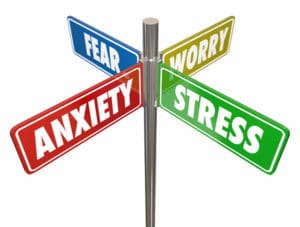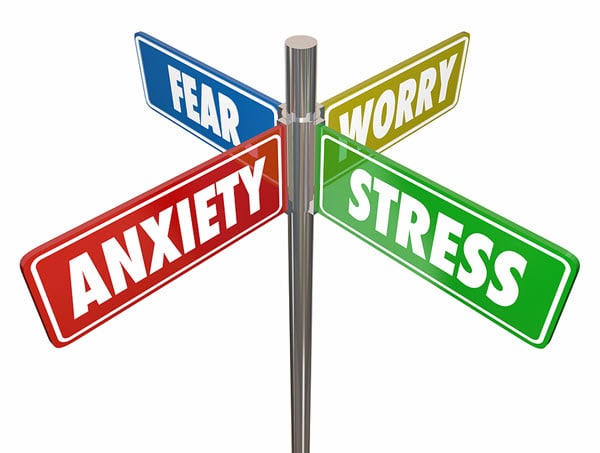Table of Contents
Key Takeaways
- Understanding the root causes of anxiety, often associated with neurotransmitter imbalances, is crucial.
- Certain nootropics can be effective in alleviating anxiety symptoms by targeting specific neurotransmitters.
- Acetylcholine, dopamine, and GABA are some neurotransmitters related to anxiety, and supplements like Alpha GPC, CDP-Choline, and L-Tyrosine can help modulate their levels.
- A trial-and-error approach may be necessary to find the most effective nootropic for individual anxiety relief.
- Nootropics offer a natural alternative to traditional anti-anxiety medications, with the potential for fewer side effects1.
This post is for you if tried anti-anxiety meds, Cognitive Behavioral Therapy, counseling, or psychotherapy. And are looking for a natural nootropic alternative to optimize your brain health.
Or maybe you tried talking to your doctor about how you feel and didn’t get the help you need.
It may be of little comfort, but did you know there is a 77% chance that your anxiety has been misdiagnosed as some physical problem instead?[i]
Because anxiety often manifests as sweating, trembling, nausea, abdominal problems, dizziness, insomnia, heart palpitations, accelerated heart rate, chest pain, shortness of breath, pins and needles, feeling like your losing control and/or feelings of impending doom.
Instead of dealing with the real cause, maybe you were sent down the wrong path. And are still looking for answers.
Nootropic supplements may help if you’re dealing with a genuine anxiety disorder. The kind of anxiety that has you feeling constantly on-edge and an overwhelming sense of dread.
The type of anxiety where you have difficulty concentrating, you’re irritable or restless to the point you’re avoiding family and friends just to numb yourself from feelings of worry and unrelenting doom. Stress hormones gone nuts.
You know, it’s that very type of stress that makes your blood pressure rise from doing too much, or being stretched thin and depression symptoms start to peak through your window and you may even begin to manifest this unresolved energy into panic attacks? Yeah, we’re talking about that kind.
Here you’ll discover the real cause of your anxiety symptoms. And get some help dealing with how you feel. Concrete steps to take that doesn’t include meditation, yoga, Cognitive Behavioral Therapy, or psychoanalysis.
The Root Cause of Generalized Anxiety Disorder
Something may have happened that triggered the anxiety that has turned your life upside down. But if your feelings of anxiety are hanging on and won’t let go, it’s likely because of the dysfunction of neurochemicals in your brain.[ii]
It could be problems with acetylcholine, dopamine, GABA, glutamate, norepinephrine, or serotonin.
But the challenge is figuring out which neurotransmitter is causing the problem. And why drugs like benzodiazepines, SSRIs, SNRIs, TCAs, and MAOIs are often prescribed for treating anxiety.
How to Find the Root Cause of Your Anxiety Symptoms
 If you have been using an anti-anxiety drug and experienced some relief in your symptoms, you have a head-start.
If you have been using an anti-anxiety drug and experienced some relief in your symptoms, you have a head-start.
Because now you have a clue what could be causing your problem. And it may be easier for you to decide which nootropics to try to help you get better and improve cognitive functioning.
First, become familiar with the mechanism of action (or pharmacology) of the med you are using. Wikipedia.org is a good resource for this information.
Simply do a search of Wikipedia for your drug’s generic name. And scroll down to the section “Pharmacology”. Sometimes called the “mechanism of action”.
Once you understand how the drug works in your brain. And which neurotransmitter system it affects. Scroll down the list of nootropic supplements below.
And choose one of the anti anxiety nootropics that has a similar mechanism of action to the drug you were using. Then follow the dosage recommendations for that supplement and try it to see if you feel any anxiety relief.
Typical signs of relief can include positive cognitive performance like reduced brain fog and mental fatigue, less emotional stress, and lowered blood pressure.
But if you’ve never tried using a pharmaceutical to treat your anxiety, or have used one that didn’t work, you’ll need to try each nootropic separately.
And by trial and error you’ll work your way down to find the neurotransmitter system that is causing your anxiety and mental disorders.
Start at the beginning of the list below and try the first nootropic for 1 or 2 days. And see how you feel. If you experience relief from your anxiety symptoms and improved mental health, success!
Now you know which neurotransmitter to work with. You can continue using that nootropic as recommended. And look for other natural nootropic adaptogens that work on the same system.
But if the first nootropic you try doesn’t provide any comfort for lowering your anxiety, put it aside. And try the next one for a couple of days again following dosage recommendations.
Go through the list one-by-one until you find a nootropic that helps you and relieves at least some of your anxiety symptoms.
Some of the nootropics on the list below are precursors. Which means it provides the chemical or molecule needed to make a specific neurotransmitter.
And others are adaptogens that affect a specific neurotransmitter system. Usually by modulating how that brain chemical works in your brain and improving cognitive function.
Let’s get started …
 Neurotransmitter imbalances
Neurotransmitter imbalances
Acetylcholine
Acetylcholine plays a critical role in learning and memory. And acetylcholine levels are modulated by levels of stress in several regions of your brain.
Acetylcholine levels decline as you get older. You need choline for the production of acetylcholine. Not eating enough foods high in choline can also result in insufficient acetylcholine.
In fact, choline is so vital to cognition and nerve function that, without it, we couldn’t move, think, sleep or remember anything.
Studies show that acetylcholine signaling in your hippocampus regulates social stress resilience and anxiety.[iii]
You can increase acetylcholine levels in your brain using either Alpha GPC or CDP-Choline (Citicoline).
Alpha GPC
 Alpha GPC is a precursor to the neurotransmitter acetylcholine. Alpha GPC naturally occurs in your brain as a byproduct of phosphatidylcholine (PC).
Alpha GPC is a precursor to the neurotransmitter acetylcholine. Alpha GPC naturally occurs in your brain as a byproduct of phosphatidylcholine (PC).
When your brain needs more choline, and the choline floating around in your brain is running low, it breaks down PC from cell membranes. And turns it into Alpha GPC.
Alpha GPC, acetyl L-carnitine (ALCAR), and phosphatidylserine (PS) provide mitochondrial support and conserve growth factor receptors.
DHA (Omega-3) combines with Alpha GPC and PS to form brain cell membranes critical for neuron generation and regeneration.[iv]
Recommended dosage of Alpha GPC is 300 mg 3-times per day.
CDP-Choline (Citicoline)
CDP-Choline is a type of choline that is present in every cell in your body.
Taken as a supplement, it’s then converted to cytidine and choline in your gut. Once it crosses the blood-brain barrier it’s converted back to CDP-Choline.[v] The choline then assists cell membranes and helps create acetylcholine.
CDP-Choline is involved in memory and cognitive functions. And provides energy for the brain to conduct sustained mental effort.
Recommended CDP-Choline dosage is 250 – 500 mg per day.
Dopamine
L-Tyrosine taken as a nootropic supplement converts into the neurotransmitter dopamine.
 Dopamine helps control movement in your body, is fundamental to memory, attention and problem solving.
Dopamine helps control movement in your body, is fundamental to memory, attention and problem solving.
The unused dopamine can then convert into the catecholamine neurotransmitters norepinephrine (noradrenaline) and epinephrine (adrenaline).
Norepinephrine is important for attentiveness, emotions, sleeping, dreaming, and learning.
Epinephrine drives your ‘flight-or-flight’ response. It’s what prompts your reaction to dangerous circumstances, emergency situations, or in stressful situations or environments.
Sleep deprivation and extreme stressors like heat and cold can deplete catecholamine levels. L-Tyrosine restores them to preserve optimal cognition and reduce anxiety.[vi]
Recommended dosage of L-Tyrosine is 500 mg 2 or 3-times per day.
GABA
GABA (Gamma-amino butyric acid) is the most abundant inhibitory neurotransmitter in your brain. And known to counterbalance the action of the excitatory neurotransmitter glutamate.
GABA has long been recognized as the main regulator of anxiety. And the GABA neurotransmitter system is the main target of benzodiazepines and other anxiety related drugs used to treat anxiety disorders.[vii]
When GABA is taken as a nootropic supplement, and contrary to what you may have read elsewhere, crosses your blood-brain barrier, it binds with the GABAA receptor protein complex, and acts as an agonist: inducing changes in which the permeability of the central pore to chloride ions gets increased.
The resulting chloride flux hyperpolarizes the neuron, leading to a reduction in its excitability. And producing a general inhibitory effect on neuronal activity.[viii]
Recommended dosage of GABA is 250 – 500 mg per day
Glutamate
L-glutamine is a ‘conditionally’ essential amino acid and main precursor for the production of glutamate and GABA in your brain.
(NOTE: Don’t confuse glutamine with glutamate!)
Glutamine is the most abundant amino acid in your body. And is involved in many of your bodily functions. Including much of the activity in your brain.
 But Glutamate is the main excitatory neurotransmitter in your brain.[ix] And the balance of glutamine and glutamate is critical for optimal brain function.
But Glutamate is the main excitatory neurotransmitter in your brain.[ix] And the balance of glutamine and glutamate is critical for optimal brain function.
Glutamate plays various important positive roles in your brain including brain development, learning and memory.
And degenerative roles including stroke, traumatic brain injury, Huntington’s and Alzheimer’s disease, stress response, and anxiety disorders.
Glutamate mainly acts through ion channel receptors including NMDA receptors, AMPA receptors, and G protein-coupled metabotropic receptors (mGluR1-8).
Glutamate is involved in synaptic release of acetylcholine, adenosine, kappa opioid, GABA, and neuropeptides.[x]
Recent research shows that glutamate dysfunction is involved in fear conditioning, OCD, PTSD, anxiety disorder and social phobia.[xi]
Monosodium glutamate (MSG) which is used as a flavor enhancer has been linked to obesity, metabolic syndrome, and neuron toxicity that can lead to cell death causing stroke, epilepsy, schizophrenia, anxiety, depression, Parkinson’s disease, Alzheimer’s disease, Huntington’s disease, and amyotrophic lateral sclerosis (ALS).[xii]
Eliminating your anxiety could be as simple as avoiding all foods containing MSG.
When your neurotransmitters, including L-glutamine and glutamate are in balance, you feel motivated, productive, and energetic. And you feel calm and relaxed during downtime.
When L-glutamine levels are low you feel filled with dread, you’re constantly worried, you have racing thoughts, and you’re frequently late and disorganized.
When you are in this L-glutamine slump is when you’re tempted to resort to high carbohydrate foods, and drugs or alcohol to relax.
Recommended dosage of L-Glutamine is 2 – 5 grams per day.
But remember, glutamine and glutamate must be in balance! If you suspect your glutamate levels are too high, you can get it under control by inhibiting its NMDA and AMPA receptors.
Some antidepressant drugs relieve anxiety by inhibiting NMDA receptors.[xiii]
Try the nootropics including Cat’s Claw[xiv], and L-Theanine[xv] for inhibiting NMDA receptors. And Noopept[xvi] and many of the racetams[xvii] which inhibit AMPA receptors.
Keeping glutamate under control and helping to reduce anxiety if your condition is caused by glutamate dysfunction.
Serotonin
Serotonin plays a significant role in the development and persistence of anxiety disorders.
 Several studies show that increases in serotonin increases anxiety. And when serotonin decreases you may experience a reduction in the anxiety that’s associated with OCD or PTSD[xviii].
Several studies show that increases in serotonin increases anxiety. And when serotonin decreases you may experience a reduction in the anxiety that’s associated with OCD or PTSD[xviii].
Too much serotonin and excess serotonin signaling has been implicated in social anxiety disorders.[xix]
If you are experiencing any type of anxiety, you should avoid anything that increases serotonin. Do NOT use nootropics like L-Tryptophan or 5-HTP.
Instead, use nootropics that help modulate serotonin and bring it under control.
Bacopa Monnieri helps modulate serotonin and dopamine which produces an anxiolytic effect. Studies show that Bacopa is as effective as the anti-anxiety drug lorazepam in reducing anxiety.[xx]
Vitamin D3 and Omega-3s (EPA & DHA) helps control serotonin synthesis and action. EPA helps inhibit serotonin release and DHA influences serotonin receptors. While Vitamin D3 deficiency can contribute to anxiety. Supplementing with Omega-3s and Vitamin D3 may help reduce anxiety.[xxi]
Ginkgo Biloba acts as a monoamine oxidase inhibitor (MAOI) which helps boost dopamine in your brain. Increasing dopamine can help lower serotonin levels. The result can be a reduction in anxiety.[xxii]
Rhodiola Rosea is an adaptogen that has been used in traditional medicine for thousands of years. Rhodiola enhances stress tolerance and relieves anxiety by modulating key brain neurotransmitters such as serotonin, norepinephrine and beta-endorphins (opioid neuropeptides).[xxiii]
Anxiety Disorders Eliminated
Nootropics are a viable and potent alternative to many anti-anxiety medications.
But you first need to determine the cause of anxiety in your brain. Use the trial and error method I suggested above and work through the nootropic supplements recommended one-by-one.
If you are not experiencing any results from taking a single nootropic, it may be that a combination of nootropics may be required to get the job done, and once the cross the blood brain barrier, have an effect.
Just remember, that the goal of experimenting is to find what works best for you is so you can determine what gets you the best results for reducing stress, improved mental energy, and reduce anxiety symptoms.
But a very strong word of caution – if you are currently using any prescription anti-anxiety or antidepressant medications. Or any medications for that matter. Research each nootropic including side effects and prescription drug interactions before using them.
You can relieve anxiety and bring on stress relief once-and-for-all with nootropics. If you do your research. And are willing to experiment until you find the one or two that is right for you, and mental clarity will come.







Join The Discussion - 173 comments
Chris
October 28, 2022
Hi David. I really like your site here, it’s very interesting I am trying to understand would could work for me.
I have OCD, Social Anxiety + general anxiety.
My last medication was Effexor Venlafaxin. I have tried many.
I recently quit it, it was very hard, I had the so called brain zaps for a week and do still get it but it’s tolerable.
It has worked very well for my OCD and some but less for my anxiety, it was in high dosis 225-300 mg.
It was probably the best one iv’e tried.
But i found myself always tired, no matter how much sleep and also a lack of emotions. I was also concerned about the side effects. I am also never going back after the withdrawel side effects.
I want to try my luck with natural options.
My question is for you.
Do you think this stack can help me?
Gingko biloba – Bacopa Monnierni – Cat’s claw – Alpha GPD – Noopept – Glutemine – Inositol 18g per day.
Iv’e tried L-Theanine but i suspect it gives me more anxiety, so it want to try Cat’s claw since it will also effect the NMDA repectors and has the BNFD boost benefit.
Would you recommend i change or add something? Thanks.
Chris.
David Tomen
October 29, 2022
Chris, use the search function to right of the top menu and search for the keywords “OCD” and “social anxiety”. You will get a list of supplements shown in studies and anecdotally to help with both.
The key to make nootropics work for you is being willing to experiment. If something doesn’t work then try something else. If something causes problems then avoid using it.
Beth Armsrtong
October 4, 2022
Dear Dave ~ “If you are experiencing any type of anxiety, you should avoid anything that increases serotonin.
[edited for length]
Beth Armsrtong
October 4, 2022
I am also taking Vit D and Omega 3 too each day Dave …
David Tomen
October 5, 2022
Beth, summarize your question in two or three sentences please. I cannot read a block of text nor do I have the time.
Beth Armsrtong
October 5, 2022
Hi David – I have severe OCD, overwhelming anxiety and insomnia. I currently take 200mg theanine + 100mg L-Tyrosine in the morning and 1g Taurine + 1.5g L-Tryptophan in the evening. I also take choline, vit d and Omega 3, probiotics and other vitamin and mineral supplements. It needs tweaking as it is not working and I have just read that I shouldn’t be taking anything that increases serotonin. Please can you help me
David Tomen
October 9, 2022
Beth, you are likely using too much L-Tryptophan. Cut that back to 500 mg before bed.
And before you add these I suggest you read my full review for each. But they have been shown to help with OCD: Lemon Balm, Saffron, L-Glutamine, Uridine Monophosphate, Glycine and Valerian.
Charlotte
October 4, 2022
Serotonin is a funny one, isn’t it. One reads variously that too much and too little is the culprit.
SSRIs do work for me – they keep serotonin around for longer, as you know.
So why would tryptophan and 5HTP have an adverse effect?
David Tomen
October 5, 2022
Charlotte, SSRIs do not really “keep serotonin around for longer”. They are ‘reuptake inhibitors’ which changes the normal mechanism of how serotonin is used in your brain. You cannot compare them. It is true that some who are deficient in serotonin respond well to L-Tryptophan or low dose 5-HTP. But they may not respond well to SSRIs.
I am a classic case of being low in serotonin so 500 mg L-Tryptophan helps me if taken before bed. But get sick if I use an SSRI.
Charlotte
October 4, 2022
Tried GABA many times – before I knew it probably doesn’t cross the blood brain barrier, and after, when it was hypothesised that the supplement might still work another way.
And GABA supplements often have raving reviews.
I’ve never experienced the slightest advantage from them, apart from a slight tingling in the toes after taking especially high doses.
I cannot understand why it works for others, and not for me (benzos do work.)
Are all the rave reviewers getting placebo effects?
David Tomen
October 4, 2022
Charlotte, more recent research shows GABA does cross the blood-brain barrier. Benzos do not “increase” GABA. Instead they attach to a specific benzo receptor which is how they provide a benefit to those who respond to it well. Simply increasing physical levels of GABA will not provide the same effect.
Some respond well to GABA because they are low in GABA to start with. I’m a classic example of this and use PharmaGABA because it more easily gets into your brain. But PharmaGABA is not likely going to work with you either because it does not sound like low GABA is your problem.
Sandra
September 15, 2022
Dear David!
May I ask you one more question about MAOI please?
“Ginkgo Biloba acts as a monoamine oxidase inhibitor (MAOI) which helps boost dopamine in your brain. Increasing dopamine can help lower serotonin levels. The result can be a reduction in anxiety”
I suffer from PTSD, OCD. Through last 2 years I found the hard way, that Lithium, Tryptophan, Magnesium glycinate etc. which increase serotonin worsened my anxiety to the point where I couldn’t focus on anything more than sad intrusive thoughts inside my head. I was focused at increasing GABA and decreasing Glutamate, but it didn’t solved the whole problem.
I would like to try prescription SSRI + Curcumin but I don’t understand. In the “text” above you mentioned that MAOI decrease serotonin.
Thank you for everything David!
David Tomen
September 15, 2022
Sandra, natural MOAIs like Gingko Biloba will likely have minimal effect on serotonin. As far as I can tell from my research and practical experience Gingko doesn’t touch serotonin levels.
Erlinda
August 17, 2022
Hi David, I have dealt with anxiety all my life (75 yrs) and have not slept well in yrs. Was diagnosed with GAD a number of yrs. ago. Recently got off my BP and anti-anxiety meds to try CBD which worked opposite of what it’s supposed to. At the advice of my PCP I started taking L-Glutamine. In researching it got re-introduced to GABA and then came across your website and Nootropics. Have a few questions. I take cal/mag, Vitamin D3&K2, Ubiquinol and Omega 3. Recently started taking the L-glutamine and GABA. They are helping. Am interested in Bacopa Monnieri but I see it’s called “water hyssop”. Is it safe for people with HBP issues (mine is pretty stable now) and does it lower a HR that’s already on the low side (60’s&70’s)? Could adding B.M. and or L-theanine help even more. Also is Milk Thistle contraindicated with any of these? I can’t find anything on that.
Thanks so much for any suggestions.
David Tomen
August 21, 2022
Erlinda, Bacopa Monnieri should not cause problems with blood pressure or heart rate. L-Theanine however could lower your blood pressure and you may need to avoid it.
Milk Thistle is not contraindicated with any of them.
Mandy
August 10, 2022
This is a fantastic article that really puts it in comprehensible terms for the average person.
How can we properly discern how to check and balance the glutamine and glutamate properly as best as possible at home? Than you! Working on sorting out all of these symptoms.
David Tomen
August 10, 2022
Mandy, glutamine produces glutamate. If you are high in glutamate then using glutamine should help bring the balance back.
Kerem
July 22, 2022
Hi David, I struggle with panick attacks in some periodes of time. For the past 2 months I’m in a bubble where I’m depressive, constantly nervous and can’t eat. I tried L-theanine, omega 3, curcumin, CBD, magnesium but nothing worked much. My psychologist says there is some imbalance in my neurotransmitters but didn’t know which part. I hope you could help me in a direction. In the dr. Braverman test it says I have a low GABA. I read somewhere that if you take GABA it doesn’t go in thru the receptors. I would love to hear your opinion.
David Tomen
July 23, 2022
Keram, Myo-Inositol, Lithium Orotate, Phosphatidylcholine (PC), Passionflower extract and L-Theanine have all been shown to help reduce panic attacks.
BTW, GABA does cross the blood-brain barrier. And PharmaGABA is especially effective at lower doses compared to synthetic GABA.
Kerem
July 24, 2022
Thanks for your reply. I was wondering what do you think about this stack for my problem:
1. PharmaGABA
2. L-Tryptophan
3. Vitamin B-Complex (with 100 mg Inisitol)
4. Vitamin D3 (which I have a deficiency in)
5. Omega 3
6. L-theanine
Thanks for helping me out!!
David Tomen
July 24, 2022
Try it and see if it works for you. Give it a week of daily use and you’ll know whether it helps or not.